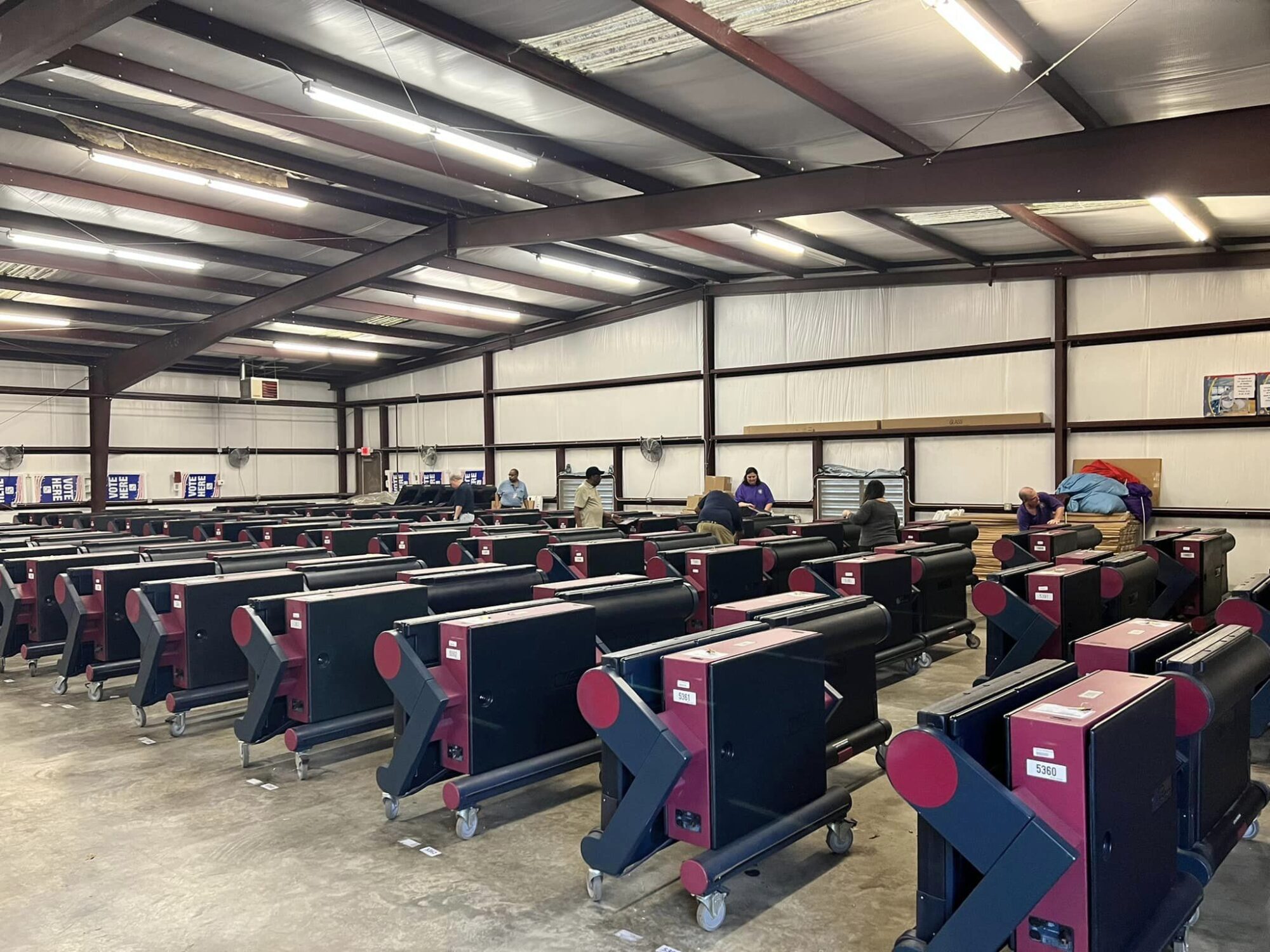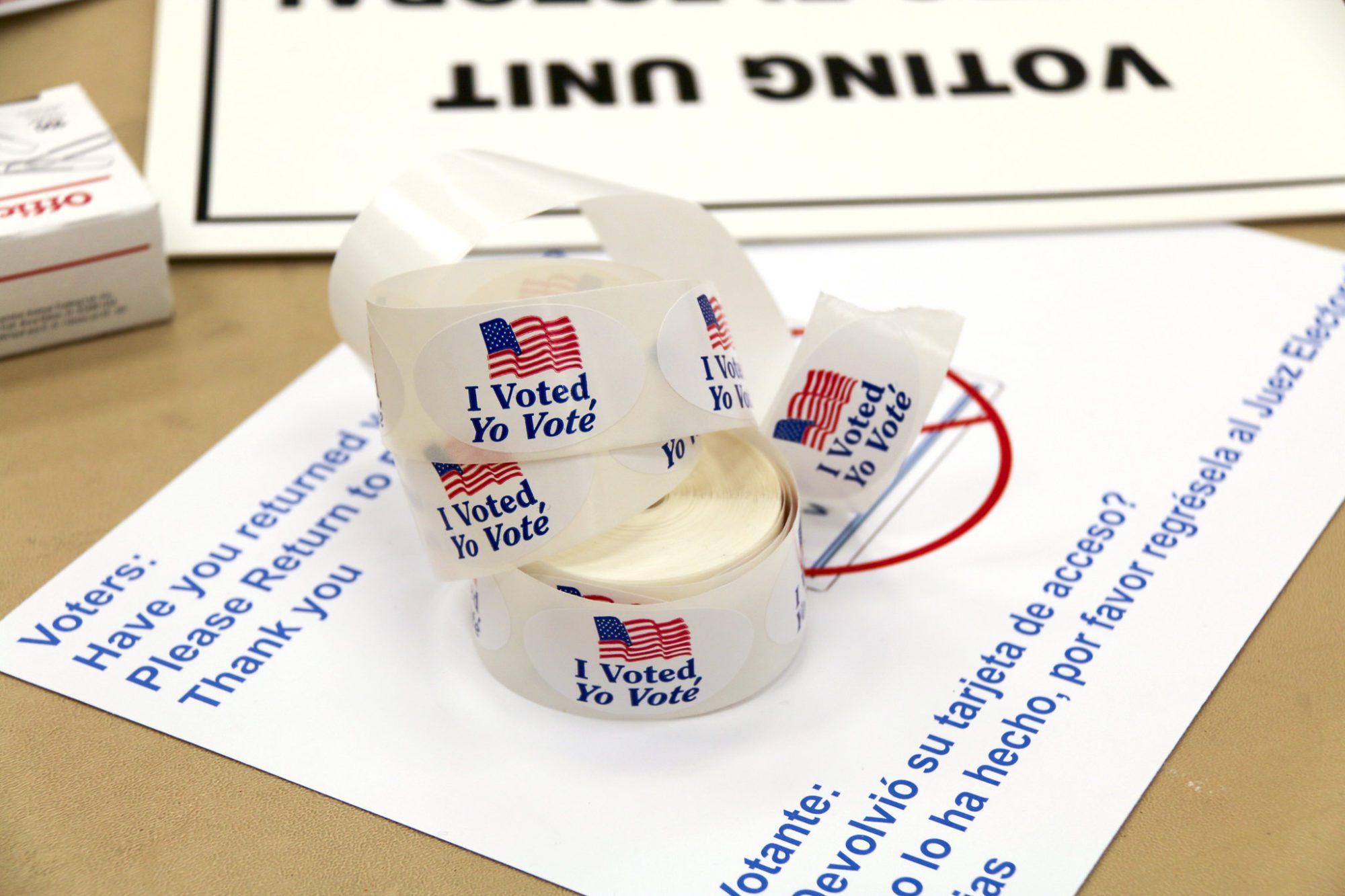Louisiana First in the Nation to Vote on Banning Private Elections Funding
Amendment 1, which GOP lawmakers put on the ballot for the upcoming Oct. 14 election, is part of a broader, conspiracy-fueled narrative about Trump’s loss in 2020.
Alex Burness | August 24, 2023


Louisiana’s Ascension Parish stores its voting machines in a warehouse without climate control, says Bridget Hanna, the parish’s elected clerk of court and top elections official. This worries her on days like these, when temperatures routinely hit 100 degrees, compounded by extreme humidity.
Louisiana’s voting machines are from 2006—old enough that when they falter, Hanna says, it’s often impossible to locate replacement parts. That’s a common frustration: aging voting equipment poses a projected multi-billion-dollar concern in the United States, amid a general national crisis of underfunding for local election administration.
“The state is scrambling to make sure they have enough machines for everyone, but we can’t get them anymore,” Hanna, a Republican, told Bolts. “We’re just hanging on.”
Hers is the kind of local election office that Facebook founder Mark Zuckerberg said he sought to help in 2020, when he and his wife, Priscilla Chan, donated some $350 million to a previously obscure nonprofit organization called the Center for Tech and Civic Life (CTCL), which helps maintain and improve local election procedures and ballot access around the country. The COVID-19 pandemic had just set in, and election administrators, who in many cases already had limited budgets and inadequate staffing, were facing dramatic new challenges: outfitting poll workers with personal protective equipment, establishing drive-through voting, and preparing for much more mail-in voting than usual, to name a few.
An NPR analysis done soon after the election found officials applied for and accepted some amount of CTCL money in more than 2,500 different local jurisdictions, covering every U.S. state except Louisiana, Delaware, and Wyoming. The money was used for a variety of purposes, including ballot processing equipment and improved pay for election workers.
Those early-pandemic days of emergency voting procedures ended long ago, but the CTCL donations set off a wave of political uproar around election funding that is still rippling through state governments, including in Louisiana—even though none of the money even reached election offices there.
Now, after three years and several legislative attempts in Louisiana to kick private money out of elections offices, the state will become the first in the nation to vote on the matter directly. In the Oct. 14 election, Louisianans will see a proposed constitutional amendment, placed on the ballot by the GOP-controlled legislature, that would ban private or foreign money from being used for the purpose of conducting elections.
This proposed ban, Amendment 1, would if passed make Louisiana the 26th state to adopt such restrictions, all directly inspired by what conservatives have demonized as “Zuckerbucks” spent on elections during the onset of the pandemic. The billionaire’s donations have drawn particular ire from conservatives convinced that CTCL boosted Democratic get-out-the-vote efforts, and the partisan outrage is clearly reflected in state policies: 23 of the 25 states that already adopted such restrictions voted for former President Donald Trump in 2020 or have Republican legislative trifectas, or both.
Louisiana’s Republican secretary of state, Kyle Ardoin, initially urged local election offices to apply for CTCL grants. But soon after, Republican Attorney General Jeff Landry, who is now a candidate in Louisiana’s November gubernatorial election, sent parish clerks a letter warning that it would be illegal to accept the money and ordering them to stop seeking it. (Landry’s warning was incorrect; state law at the time said nothing about how local offices could raise money for elections.)
Clerks across Louisiana were suddenly blocked from large sums of money that could have helped with the myriad challenges they faced in running smooth elections on dated equipment during a pandemic. Hanna’s parish, for one, was set to receive $114,000 before Landry stepped in, according to the Louisiana Clerks of Court Association.
Louisiana might have already joined other states with a law banning the donations if not for its Democratic governor, John Bel Edwards, who is term-limited and will exit office in January. In 2020, 2021, and 2022, he vetoed anti-“Zuckerbucks” bills passed by the legislature, condemning what he termed an “unnecessary political ploy.” Statehouse Republicans circumvented the governor this year by referring their proposal directly to the ballot; with supermajorities in each chamber, they sent the ballot measure to voters without ever needing Edwards’ sign-off.
Peter Robins-Brown, executive director of the nonprofit Louisiana Progress and an advocate for voting rights, has little doubt that Amendment 1 will pass, even as no polling on the issue has been publicly released to date. Robins-Brown said he finds it troubling, though, that state Republicans have been so bullish on this policy for several years running, without taking seriously the broader concerns that Zuckerburg’s money was supposed to help alleviate.
“If you’re going to do this,” he told Bolts, “you also need to make sure that election administration is fully funded, and that’s where I think there’s the element of potential bad faith here: you’re going after this one piece of the larger puzzle without addressing the underlying problem, which is underfunding of election administration.”
Louisiana’s election funding problems go beyond the outdated voting machines. Hanna said local elections officials like her struggle to recruit and pay election workers, and Debbie Hudnall, executive director of the Louisiana Clerks of Court Association, added that some clerks can’t staff up adequately during elections.
“Finding citizens who want to spend those hours working the polls—sometimes that’s been difficult,” Hudnall, herself an elected parish clerk from 1980-2007, told Bolts. “Back when I was a clerk of court, people felt it was a civic duty to go work the elections. It’s harder now.”
Neither that problem nor the issues of aging infrastructure and general underfunding of elections are unique to Louisiana or the primarily red states that have taken up bans on outside funding of elections. But “Zuckerbucks” critics have noted that the donated money disproportionately aided election administrators in states that voted for President Joe Biden in 2020.
While CTCL says it distributed grants to election administrators in 47 states, the Capital Research Center, a conservative watchdog group, found that the grant money benefitted Biden states that year almost twice as much as it did Trump states—$217 million to $114 million. In per-capita funding, the group found, Georgia—a critical battleground in the last presidential election—was by far the highest state beneficiary, and the swing states of Wisconsin, Pennsylvania, and Michigan all ranked among the top seven in per-capita funding from the group. All sided with Biden in 2020.
CTCL has said that it disbursed money based only on applications received, in a process that states opted into. The organization also defended itself against allegations of Democratic bias, stating in 2021, “There were no partisan questions in the grant applications. CTCL COVID-19 Response grant funding decisions were not made on a partisan basis, and as demonstrated by the jurisdictions across the political spectrum that received money, partisan considerations played no role in the availability or awarding of funding.”
Conservatives backing Louisiana’s Amendment 1 have not only rejected the nonprofit’s defense, but roped their outrage over “Zuckerbucks” into a broader, conspiracy-fueled Trumpist narrative that the 2020 election was “stolen” from Trump. In a letter to the editors of The Advocate, Louisiana Republican Party Chair Louis Gurvich said that the money “was used by Democrat political machines across the country for highly partisan get-out-the-vote efforts such as vote harvesting, ballot drop-off boxes, etc.”
The campaign to pass Amendment 1 counts among its supporters the Election Transparency Initiative, which is chaired by former Trump appointee Ken Cuccinelli and which opposes policies that have been shown to increase democratic participation, including same-day voter registration and automatic voter registration.
But even as they put the question in front of voters, the conservatives who pushed for Amendment 1 don’t appear to be harnessing much grassroots passion; to the contrary, Hanna told Bolts, the “Zuckerbucks” controversy is something average voters rarely raise with local officials like her. There is no organized campaign for or against the measure, and state campaign finance data show no one has spent any money formally opposing or supporting it.
In the absence of much public discourse on the matter, voters will be left with a question that Louisiana voting rights advocates worry is so facially simple—a referendum on private interests influencing election procedures—as to totally belie the far-right, anti-democratic movement in the background.
Robins-Brown says that without context, many people of varying political stripes will likely be persuaded by the argument that a private or foreign interest shouldn’t be sending Louisiana money to perform basic governmental operations.
“This thing that had its genesis around conspiracy theories in the midst of COVID did sort of morph into an idea that is viable. I’m not saying I’m fully on board and that I’ll vote yes, but I think there’s a solid point here,” he said.
Ashley Shelton, a progressive organizer who founded and leads Louisiana’s Power Coalition for Equity and Justice, told Bolts her organization does plan to campaign against Amendment 1. She said Amendment 1’s backers have exposed their hypocrisy by slamming “Zuckerbucks” without turning scrutiny to the myriad other ways that outside money influences policy and thus state governmental function.
In 2021, for example, the same Louisiana state legislature that had just passed an anti-“Zuckerbucks” bill also passed a spending bill allowing itself to receive and spend money obtained via private donations. The irony was not lost on Edwards, who, in a letter accompanying his veto of the former bill, questioned how “the Legislature is somehow immune from the improper influence of grants and donations that … would end up corrupting local election officials.”
Said Shelton,“They’re worried about Zuckerburg but nobody is talking about these other agendas that are also supported by private money that isn’t Zuckerburg.”
Shelton said she can only conclude, then, that Amendment 1 is meant to evoke fear and to continue choking efforts to streamline ballot access and boost turnout. She notes that the measure seeks to ban “foreign” money in election administration—a response to a fictitious threat, she said, but a useful way to gin up voter outrage.
“I’ve been doing election work in the state of Louisiana for a very long time, and I have not been and am not worried about the engagement of a foreign government,” she said. “This is worse than a solution in search of a problem. This is all about election administration and creating more limitations and barriers to voting.”
Sign up and stay up-to-date
Louisiana Votes
Bolts is closely covering the ramifications of Louisiana’s 2023 elections for voting rights and criminal justice.


